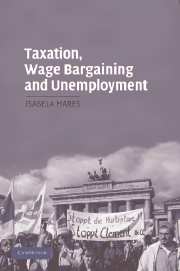Book contents
- Frontmatter
- Contents
- List of Figures and Tables
- List of Abbreviations
- Acknowledgments
- INTRODUCTION: DOES THE WELFARE STATE HURT EMPLOYMENT?
- 1 THE ECONOMIC AND POLITICAL CONSEQUENCES OF WELFARE STATE MATURATION
- 2 A QUANTITATIVE ANALYSIS
- 3 SWEDEN
- 4 GERMANY
- 5 BRITAIN
- CONCLUSION: NEW SOCIAL PACTS IN CONTEMPORARY EUROPE
- References
- Index
- Titles in the series
1 - THE ECONOMIC AND POLITICAL CONSEQUENCES OF WELFARE STATE MATURATION
Published online by Cambridge University Press: 06 January 2010
- Frontmatter
- Contents
- List of Figures and Tables
- List of Abbreviations
- Acknowledgments
- INTRODUCTION: DOES THE WELFARE STATE HURT EMPLOYMENT?
- 1 THE ECONOMIC AND POLITICAL CONSEQUENCES OF WELFARE STATE MATURATION
- 2 A QUANTITATIVE ANALYSIS
- 3 SWEDEN
- 4 GERMANY
- 5 BRITAIN
- CONCLUSION: NEW SOCIAL PACTS IN CONTEMPORARY EUROPE
- References
- Index
- Titles in the series
Summary
In the introduction I reviewed the main propositions of two competing theoretical approaches to variation in employment performance among advanced industrialized democracies: the corporatist approach and an economic approach that relies on the assumption of perfectly competitive labor markets. The corporatist literature has been more successful than the neoclassical framework in explaining cross-national variation in macroeconomic and labor market outcomes. But corporatist studies fail to account for both cross-national and intertemporal changes in labor market outcomes across advanced industrialized economies. Most corporatist scholars praise the “institutional advantages” of economies with highly centralized labor market institutions for delivering egalitarian income distribution, high levels of wage moderation, and labor peace. But these studies do not provide an explanation for the deterioration of the labor market performance of these economies in the last two decades. The main theoretical objective of this chapter is to extend and amend the conclusions of the corporatist literature in an effort to explain both cross-national as well as intertemporal variation in employment outcomes.
The outline of this chapter is as follows. I begin by reviewing the most significant theoretical developments in the literature that examine the impact of labor market institutions on labor market outcomes. These studies differ in the precise specification of the functional form of the relationship between labor market institutions and economic outcomes. Recent studies have formulated an important qualification of earlier results, suggesting that differences in a government's macroeconomic orientation affect both the optimal wage behavior of trade unions and the equilibrium level of unemployment.
- Type
- Chapter
- Information
- Taxation, Wage Bargaining, and Unemployment , pp. 17 - 60Publisher: Cambridge University PressPrint publication year: 2006



